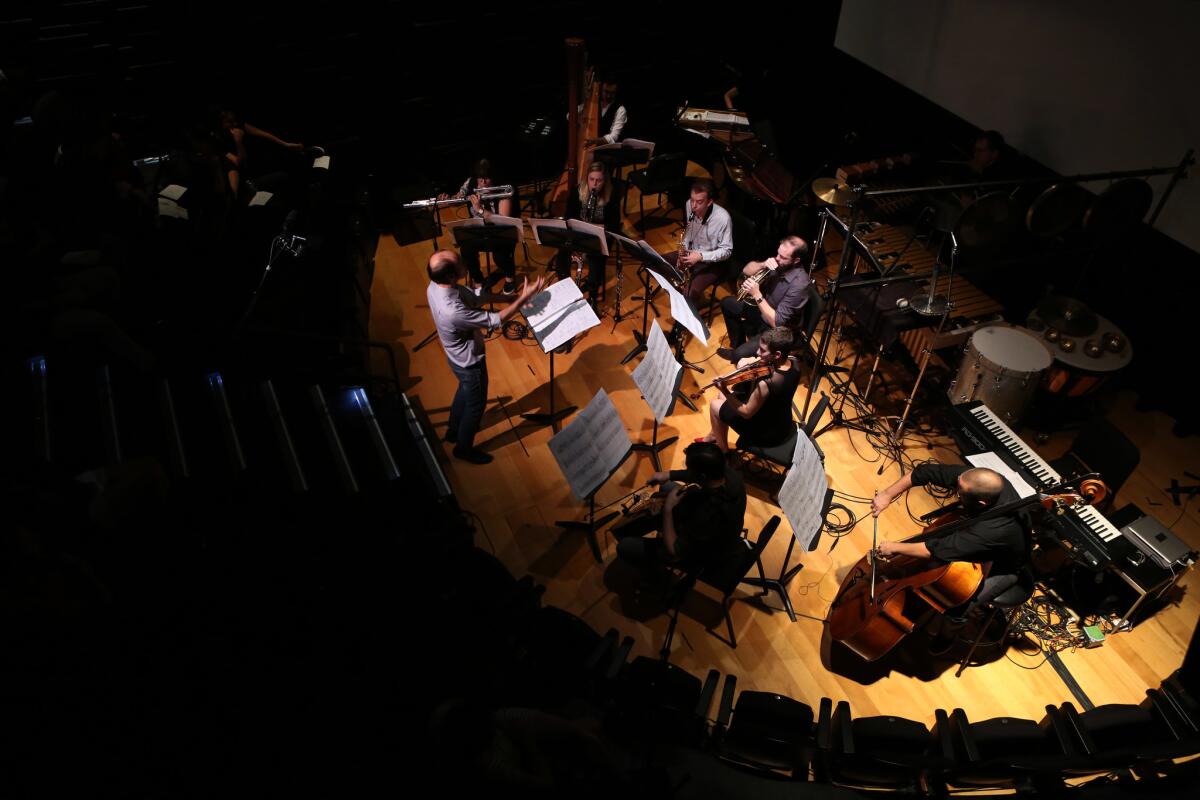Review: Chicago-based Dal Niente pops up in new L.A. music series called Poolhouse

- Share via
The Los Angeles debut of the provocative Chicago collective Ensemble Dal Niente on Thursday night came courtesy of a new music curatorial dream team, composer Ted Hearne and violinist Anna Bulbrook, who have begun a pop-up series called Poolhouse.
Hearne is the composer of the Chelsea Manning opera, “The Source,” recently mounted by Los Angeles Opera, as well as half of the pop duo R We Who R We. The classically trained Bulbrook is a rock star, a member of the popular and literate rock band the Airborne Toxic Event.
New music in L.A. is already hopping, open-minded and in no need of defining. Still, Poolhouse looks to be a uniquely hip yet brainy building of new bridges. It popped up Dal Niente, appropriately enough, at USC’s Brain and Creativity Institute. The institute’s intimate, cave-like Cammilleri Hall gave the impression of the inside of a brain. It had good acoustics and seemed a perfect fit for Dal Niente.
Dal Niente, which is part of a lively new music scene in Chicago unjustly lacking the national attention given Brooklyn and L.A., takes its intellectual inspiration from the post-World War II European avant-garde that went out of fashion in the U.S. with the advent of Minimalism and now the pop-infused post-Minimalism hallmark of the Brooklyn sound. The ensemble has further earned its European avant-gardist stripes by being featured at ground zero of the movement, the International Summer Courses in Darmstadt, Germany, where Pierre Boulez and Karlheinz Stockhausen held forth in the 1950s. “Dal Niente” is the name of a clarinet piece by the current German dean of the movement, Helmut Lachenmann.
Dal Niente’s contribution is to bring this kind of hard-core Modernism up to date, with contemporary and even pop culture invited to the table, as long as the results are structurally rigorous and original. In the first piece, Natacha Diels’ “Ellipsis,” that meant musical mayhem being partially tamed, while on a screen behind the ensemble were occasional projections of cutouts from fashion magazines. A recurring image was a woman with a hammer, presumably a feminist rejoinder to Boulez’s most famous score, “Le Marteau sans Maitre” (The Hammer Without a Master).
In remarks to the audience, Dal Niente conductor Michael Lewanski said Diels, who teaches at UC San Diego, instructed him not to tell us what the piece is about. That won’t stop me. It was about irrational outbursts of sound from two sopranos, players sitting at tables hitting all kinds of everyday objects, engineers operating electronic equipment and more outbursts from saxophone, horn, proper percussion and cello. By the end everyone finds a rhythm they can agree upon. The neuroscientists upstairs surely would have more to say about what this means.
What made this seem less sophomoric than its sounds (or sounded) or than Diels’ pretentious mysteriousness was the precision of the playing and Lewanski’s sophisticated rhythmic management, lending strong implication of method to the madness.
Greg Saunier’s “Deerhoof Chamber Variations” suggested the opposite attitude. The composer is the drummer in Deerhoof (quoted in the program as being “The Band in the World” by Pitchfork, as if the Airborne Toxic Event is chopped liver). Saunier takes phrases from Deerhoof songs and arranges them intriguingly — bass for instance, doing something in the style of a Bach solo cello suite. There is a hint of nostalgia in the instrumental style, but also just enough unpredictability to create a sense of freshness.
“Piano Hero #1” by Belgian composer and media artist Stefan Prins is a one trick mind-bending pony. The ensemble’s pianist Mabel Kwan sat at an electronic keyboard in the right brain area of the Cammilleri stage, where she proceeded to mess with our spacial and musical processing functions. As she hit the keys, the sounds produced were those of attacking the strings inside piano with the piano’s hammers, and that was what was being projected on the screen above her.
The last piece was a study in sonic saturation by French composer Raphaël Cendo, who is obsessed with excess in his over-the-top-scores. The 10 players forced more sound out of their instruments than appeared comfortable for them (everyone looked quite worried). Still, Lewanski, who is an excellent conductor, maintained a level of structural expertise that once more gave a listener faith in the music. I was glad when it was over, but I would like to hear what the institute’s neuroscientists have to say about overloading our brains with musical stimulation.
Dal Niente will give a concert with a different program at Scripps College in Claremont on Saturday. Now will someone please present the Chicago post-Cagean collective, a.pe.ri.od.ic?
------------
Ensemble Dal Niente
Where: Garrison Theatre, Scripps College, 241 E. 10th St., Claremont
When: 8 p.m. Saturday
Admission: Free but tickets required
Information: (909) 607-8505 or www.scrippscollege.edu
More to Read
The biggest entertainment stories
Get our big stories about Hollywood, film, television, music, arts, culture and more right in your inbox as soon as they publish.
You may occasionally receive promotional content from the Los Angeles Times.











